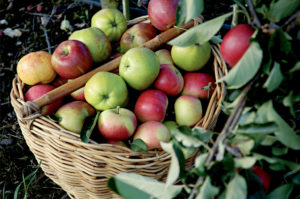Sparks really flew at the National Organic Standards Board meeting in Portland, Oregon yesterday. In one of the most contentious issues to come before the organic community in many years, the continued use of antibiotics (oxytetracycline) on tree fruit was on the agenda.

Apple growers from Washington State petitioned the USDA to allow for the continued use of oxytetracycline to control fire blight on apple and pear trees. The current conditional use is set to expire in October 2014. Some farmers testified that they would go out of business, or exit organics, if the antibiotic, which is the same material as is used to treat human illness, is prohibited from use.
Public interest groups provided over 55,000 signatures from concerned consumers. It was disturbing that certain members of the corporate sector in organics, even before the meeting started, attempted to discredit and devalue the outpouring of sentiment from consumers (mostly accomplished through web-based petitions). Even Consumers Union, the respected publisher of Consumer Reports magazine, was challenged on the propriety of their findings.
Medical experts testified that environmental contamination, by using air blast sprayers to apply the same antibiotics as humans depend on, over wide acreage, is a significant danger in developing antibiotic resistant bacteria. Consumers are understandably concerned when measurable residues of drugs are found in certified organic fruit (or any food for that matter).
Please consult The Cornucopia Institute website and Facebook page for updates on the final outcome of today’s voting in Portland.
MAK
LATEBREAKING NEWS:
We thank the NOSB for voting to prohibit the following non-organic or synthetic substances that are not essential to organic production and/or dangerous to human health or the environment (in some cases the manufacturers of these materials refused to transparently share their production methodology in order to fully evaluate their products).
1. Conventional sugar beet fiber – unanimous against
2. DBDMH (antimicrobial treatment in meat processing) – unanimous against
3. Sulfuric acid (preprocessing seaweed as a nutraceutical) – unanimous against
4. Conventional barley fiber (as a nutritional additive) – 12 against; 3 for: prohibited in organics
Antibiotics in Organic Tree Fruit Production — Simple Questions/Answers
USDA is deliberating these questions right now in Portland, OR

Is the Use of This Material a Threat to Human Health?
There is no debate that low level, chronic dietary exposure to antibiotics is deleterious to human health. This is especially important in light of the disproportionate intake of apples and apple products by children.
Some medical officials see the real risk in the wholesale disbursement into the environment of antibiotic resistant bacteria. 80% of antibiotic usage is in agriculture (mostly in livestock production).
There’s certainly also legitimate concern in terms of occupational exposure to antibiotics in the workplace (farmers and farmworkers— most of the research coming from the livestock sector).
Is the Use of This Material a Threat to the Environment?
There is concern that applying broad-spectrum antibiotics in pear and apple orchards, using air blast sprayer technology, will have an impact on microbial life and the biodiversity of the farm. Federal law governing organics mandates that negative impacts to biodiversity be considered.
Is This Material Essential in Organic Production?
It was reported by Washington researchers, at the National Organic Coalition meeting Monday, April 8, that last year, a “bad year” for fire blight in Washington, that only a minimal number of organic producers used antibiotics. Growers producing fruit for export to Europe don’t use antibiotics because they are banned from use under international organic regulations (Canada, European Union, Codex Alimentarius , IFOAM).
The Cornucopia Institute surveyed all certified organic apple and pear growers in the United States. Of the apple producers who responded to the survey (a strong 11% response rate), The majority, 56%, reported that they have never used oxytetracycline or streptomycin in their orchards. Even in the giant apple producing state of Washington, 54% had never used antibiotics on their trees/fruit.
Obviously, the majority of farmers have proven, by using more conservative cultural practices (not crowding trees, using resistant cultivars and rootstock, etc.) and naturally-based remedies, that the use of antibiotics is not essential in apple production.
Pears are generally much more susceptible to fire blight and more research is necessary before making conclusions about successful alternative production practices.
Mark A. Kastel
Senior Farm Policy Analyst
The Cornucopia Institute
Please “like” this posting on our Facebook page and/or “share” this with your friends, family and colleagues. A large response on Facebook might very well impress members of the National Organic Standards Board who are meeting in Portland, Oregon, through Thursday, debating this issue.

